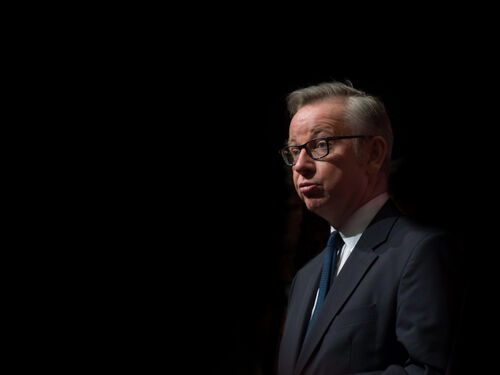Are you an extremist?

This week in Parliament, the UK government has unveiled its updated definition of extremism. It is a response to the really troubling scenes we have seen in recent months, where openly antisemitic and racist chants have been heard on our streets.
I’m sure you, like me, have been horrified by what we have seen. Large mobs have been allowed to protest, with some protestors carrying placards with disgraceful and inflammatory language. And all the while, the Metropolitan Police seem unwilling, or unable, to respond robustly. The police seem more intent on managing the protests, rather than policing them.
Well, a few weeks ago, the Prime Minister Rishi Sunak made a speech outside Downing Street. He described the ‘poison of militant Islamism and far right groups’ and said they represented a threat to our liberal democracy and to our enduring 'British values'.
He announced a range of actions the government would take, including updating its working definition of extremism to help ensure the government has the tools it needs to prevent this sort of hatred from being seen and heard on our streets.
The Minister responsible for developing the definition is Michael Gove. When he addressed MPs on Thursday, he was eager to persuade his colleagues that he was alive to their concerns about how the new definition could undermine free speech.
To help ensure this won't happen, he said a new 'centre of excellence' in combatting extremism would be set up. This would carefully decide which groups would be added to the government’s extremism watchlist.
The new extremism definition is not statutory, – which means it is not law and has no legal force – it will not be used by the police, it is only for government. Its sole purpose is to help the government decide who is an extremist and who is not.
Extremism is the promotion or advancement of an ideology[footnote 3] based on violence, hatred or intolerance, that aims to: 1. negate or destroy the fundamental rights and freedoms of others; or 2. undermine, overturn or replace the UK’s system of liberal parliamentary democracy and democratic rights; or 3. intentionally create a permissive environment for others to achieve the results in (1) or (2).
The intent is good, but the approach could spell trouble
Even before Mr Gove stood up in the Commons to announce the updated definition, campaigners and even cabinet ministers had expressed alarm at the unintended consequences of a new extremism definition. Even the Archbishops, Welby and Cottrell, put out a statement warning the new definition might disproportionately target legitimate Muslim groups and create further social division.
These are all very serious concerns which I share entirely.
Of course, I, and I suspect most of the critics, understand and share the intent behind what the government is doing. From a Christian perspective, Romans 13:1-7 is quite clear the government is God’s agent to administer justice. God has granted the ‘sword’ to civil government and it is one of their prime responsibilities to punish evil and uphold what is good.
For rulers hold no terror for those who do right, but for those who do wrong. Do you want to be free from fear of the one in authority? Then do what is right and you will be commended. For the one in authority is God’s servant for your good. But if you do wrong, be afraid, for rulers do not bear the sword for no reason. They are God’s servants, agents of wrath to bring punishment on the wrongdoer.
Moreover, the fact we have had increases in antisemitism and prejudice against Muslims and others is abhorrent. At times I have been extremely troubled by the attitudes and messaging from some of the protests. I’ve also been mystified and angered by the failure of the police, apparently, to maintain order on our streets. Is it fear? Is it a lack of resource? Either way, I think they should and could have done more. It has been deeply disturbing to read stories from Jews especially living in London expressing real fear of being harmed.
In the Christian worldview, racism in any form is wholly wrong. As the Apostle Paul rejoices in Ephesians 2, in Christ and His gospel, the dividing walls of hostility between Jews and Gentiles have been broken down! In Galatians 3:28 we read:
There is neither Jew nor Gentile, neither slave nor free, nor is there male and female, for you are all one in Christ Jesus.
And underpinning all this is that foundational reality, from Genesis 1:26-27, that humans are made in God's own image and therefore, have glory, honour (Psalm 8:5) and incredible dignity. We are made free by God. Free to think, to form convictions, to act accordingly.
Yet we are not free to commit acts of violence against others. Psalm 11:5 says:
The Lord tests the righteous, but his soul hates the wicked and the one who loves violence.
The church should stand against these expressions of hate and intimidation. They threaten our social cohesion and the common good. As such, I understand the desire on the government’s part to do more to stop it.
I just question and disagree with its approach. For me, the fundamental issue with the new definition of extremism is that it is too vague.
It talks about extremism intent to undermine democracy and parliament and actions that could take away free speech and freedom of expression for others.
But how will the government decide what constitutes undermining parliament? What does it actually mean that extremism involves robbing someone of their free speech? Policies that seek to curb free expression are notoriously problematic. There is always a danger that in trying to catch genuinely dangerous and harmful behaviour, free speech is disproportionately undermined.
For me, the fundamental issue with the new definition of extremism is that it is too vague.
This is brilliantly documented in the book Censored by the Executive Director of ADF International, Paul Coleman. He shows how in European nations that have adopted vague definitions of hate speech and extremism, the impact on genuine free speech has been chilling.
One especially frightening and troubling example is the case of Päivi Räsänen. Finnish police interrogated her for the ‘crime’ of tweeting her biblical worldview. She was acquitted in the District Court of Helsinki. But she then faced a second trial at the Finnish Court of Appeal. Alongside her tweet, in which she questioned her church’s official sponsorship pf the Helsinki LGBTQ ‘Pride 2019’ event, she was also investigated for a pamphlet she wrote in 2004 titled ‘As Man and Woman He created Them’.
Päivi endured 13 hours of interrogation, months of waiting for court procedures, two onerous trials and countless lies spread about her in the media.
Such a case could soon happen in the UK as well. On 1 April, Scotland’s notorious and much maligned Hate Crime Act will officially come into force. It was passed years ago, but it has taken the Scottish Government until now to get it ready for implementation. Critics of the bill, including CARE for Scotland, warned repeatedly that it would stifle free speech and undermine freedom of religion and expression.
The bottom line is that people should not be punished for saying things that are merely offensive.
As I've already pointed out, even cabinet ministers have warned that under this vague definition of extremism, organisations like CARE risk being blacklisted because of our convictions on human sexuality, or human identity.
Is being pro-life extreme? What about being pro-marriage? Or believing that human beings cannot change sex?
I want to stress that this does not mean I think there this is some sinister plot to try and intentionally silence all orthodox Christians. I’m loathe to play the ‘we’re being persecuted card’ because I think it is insulting to brothers and sisters who face real and genuine persecution.
But, frankly, I just do not trust the government to apply this new definition in an even handed way. I would not trust any government to do it, whatever their political allegiance. Psalm 146:3 says:
Do not put your trust in princes, in human beings who cannot save.
Add to that Jeremiah’s warning that the heart is deceitful above all things (Jeremiah 17:19) and the biblical doctrine of the depravity of human nature outside of Jesus, and you’ll see why I’m so cautious!
Now you might be reading this and thinking: is this just Christians looking out for their own again?
But it’s not just Christians who stand to lose out if this policy goes awry. There are many others who could fall foul of this new definition. And as I’ve said already, I do understand and agree with the government’s intent. I too want to see far more done to tackle far right hate groups and Militant Islamists. These agitators threaten our communities and hold values utterly contradictory to the biblical worldview.
So, what should be done to tackle Militant Islamism and far right groups?
So what can be done? Do we just wring our hands and carry on allowing blatant acts of antisemitism, racism, and violence to happen on our streets?
Not at all. As Christians, we ought to abhor such things. We should also recognise that it is the God given duty of governments to restrain evil (Romans 13).
Thankfully, the UK already has existing laws. We have the Terrorism Act which can be used to prosecute people who create a serious risk to public safety during protests. We have the Public Order Act, which outlaws other harmful behaviour.
I think these existing laws are enough. And I’d like to see the government focus on applying these laws to the unacceptable scenes of violence and intimidation we’ve seen in recent months. If there is a reason why they cannot, then come to the Commons with changes that can be debated and agreed upon.
In the Christian worldview, freedom matters. The right to speak out matters. Public safety matters. The common good and social cohesion matter. I applaud the government’s intent. I just wish I had more confidence that it is posing the right solutions.






